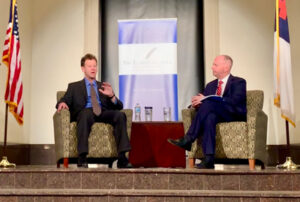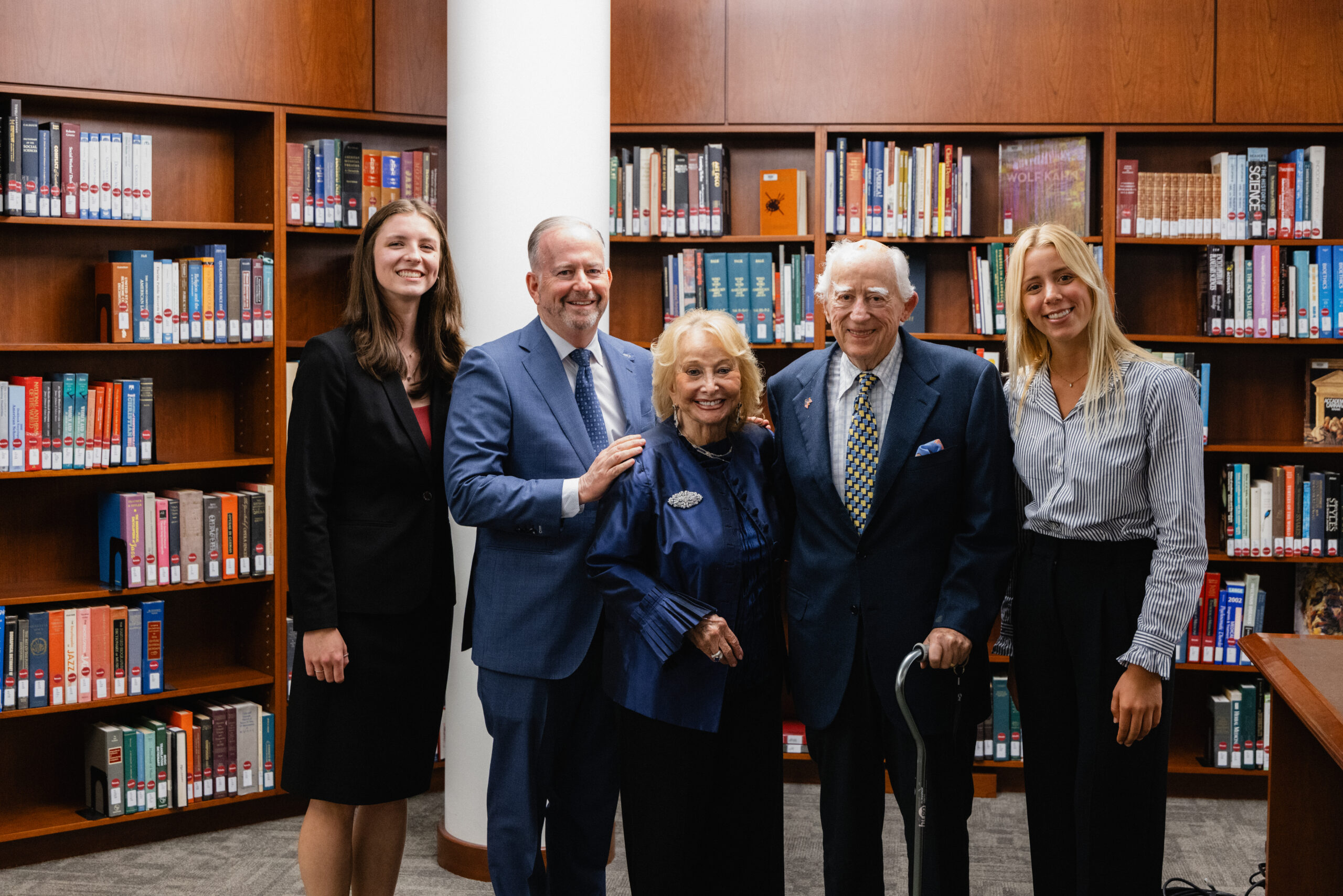 Visiting The LeMieux Center for Public Policy, foreign policy expert and scholar Michael O’Hanlon outlined strategies for the United States to mitigate danger posed by its three great rivals ‒ Russia, North Korea and China.
Visiting The LeMieux Center for Public Policy, foreign policy expert and scholar Michael O’Hanlon outlined strategies for the United States to mitigate danger posed by its three great rivals ‒ Russia, North Korea and China.
O’Hanlon, a senior fellow at the Brookings Institution, specializes in American national security policy and defense strategy. He also serves as a director of research for the Brookings foreign policy program. He teaches at the Columbia, Princeton and Syracuse universities and at the University of Denver. In 2015, Brookings published the most recent of O’Hanlon’s books, The Future of Land Warfare.
O’Hanlon visited Palm Beach Atlantic University on Wednesday (2/6) to deliver the keynote address, titled Geopolitics in the Next Decade, in the LeMieux Center’s speaker series. Sen. George LeMieux reminded the audience that each forum is designed to model “a way to discuss issues of the day that is considerate to people of all views and focus on the issues that really matter.”
O’Hanlon began his talk by offering an optimistic look at the state of the world. “Anybody who’s watching the newspapers, anybody’s who’s watching those of us in the Capitol, anyone who’s looking for problems to be solved, is probably a bit frustrated right now,” he said. “I want to underscore just how much we have going for us, even as we see a country divided and a world that’s challenged by multiple hotspots.”
As evidence, he said that for the first time in human history, half the world’s population has achieved middle-class status or greater. “That’s an incredible accomplishment, and it’s primarily on account of American foreign policy.” And while the world has seen challenges to democracy in Russia, Turkey, the Philippines and elsewhere, more people than ever are living in democracies, or at least in countries that are partially free.
Most significantly, he said, “The major powers are still not fighting each other. If we think about the state of the world today, we don’t see anything akin to what produced the world wars.”
O’Hanlon went on the outline the major sticking points in America’s most challenging international relationships, beginning with Russia.
There, he said, President Vladimir Putin “loves to play global Risk. He’s pretty good at it, but in places that are of secondary strategic importance to the United States. It’s not that we want to see Syrians or Ukrainians suffer. But when we disagree, it does not mean that we are on the verge of World War III.”
O’Hanlon does maintain that the United States needs to shore up democratic election processes in Eastern Europe and prevent any foreign election tampering here at home. But he makes a strong argument against trying to counter Putin by expanding the number of nations in the North Atlantic Treaty Organization, particularly in the case of Ukraine and Georgia. He believes further expansion of NATO would dilute the effectiveness of the alliance and would be inappropriate for nations that are Russia’s immediate neighbors.
Shifting his focus to East Asia, O’Hanlon believes President Donald J. Trump has created an opportunity to ratchet back the serious global threat posed by North Korea, though he said the president’s grandstanding has gone too far. “Given his personality and his vanity, [Trump] wants to say he’s eliminated the North Korean threat, which is false,” said O’Hanlon, a Democrat who admitted that he is not a Trump fan. In the true spirit of a LeMieux Center dialogue, though, O’Hanlon applauded Trump for refusing any concessions until North Korea makes real progress on nuclear disarmament.
O’Hanlon said he doesn’t believe complete demilitarization of North Korea is likely, as leader Kim Jong Un considers weaponry to be “the crown jewels of the country.” He sees a greater possibility for success if Trump were to approach Kim by saying, “ ‘Verifiably dismantle all of your capabilities to produce more weapons and thereby cap your nuclear arsenal, and I will tolerate you keeping some of your warheads for the foreseeable future. We’re not going to give up all the sanctions, but we can talk about humanitarian aid and trade sanctions.’ I think that’s a deal that North Korea might take.”
Finally, O’Hanlon asked, “How do you handle a rising power like China?” In addition to its rapid economic growth and its place as the second-biggest military spender on the planet, he said, China is showing no signs of further democratization. “That doesn’t mean China has to be our enemy. We have to compete hard in a number of domains.”
He pointed to low-level incursions by China’s military as a form of muscle-flexing. “Our job is to push back without escalating,” he said. “I’m worried about a scenario where China might seize an island and we have to ask, as Americans, ‘What do we do?’ We have to have a resolute, tough response with economic sanctions and perhaps increased military presence, but not a full-out military response to take back islands nobody cares about, where nobody lives. I do think we have to think hard about China, about which kinds of scenarios we’d be willing to risk world war and which scenarios we might need to push back in a more subtle way. We have to be careful about asking the American people to support big wars over nothing.”
In the question-and-answer period that followed, O’Hanlon addressed the United States’ involvement in conflict areas around the world, especially in Syria and in Afghanistan. Not long ago, he returned to Afghanistan on a research trip to see if he could continue to make a case for U.S. troops to remain.
“The Afghan people defeated the Soviet Union in the Cold War, and we pulled the plug on them and allowed the Taliban to take over,” he explained. “But you know what? Today, the Afghan government controls most of the major cities and we’re down to 14,000 troops. I’ve looked at this from a thousand different angles. I’m done with talking about exit strategies. If we leave precipitously, we don’t know what’ll happen, but more likely the Taliban is going to win. I consider 14,000 troops to be an acceptable level of U.S. presence, because I can’t see a better option.”
Syria, O’Hanlon said, is even more difficult and complex. He’s seeing indications that Trump may be willing to step back from insisting on a full and immediate withdrawal of American troops from Syria. “That may be the better part of wisdom,” O’Hanlon said, “to say we want to get out, but to recognize that doing it on any kind of schedule is really hard.”
During the introductions, Rep. Tom Rooney was introduced as the newest LeMieux Center senior fellow. The next event in the LeMieux Center speaker series event will be Feb. 27 at 6 p.m. in the DeSantis Family Chapel, when the keynote address will be delivered by Judge Jeanine Pirro, host of Justice with Judge Jeanine.

